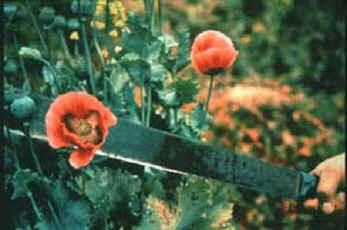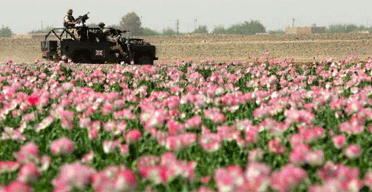Untitled Document

The British Crown looks forward to unprecedented profits from the heroin
trade in Afghanistan, reports the UK Guardian
The poppy harvest in a British-controlled area of Southern Afghanistan
called Helmand province will double this year keeping the Crown's coffers overflowing
with loot from the global narcotics market.
"The Afghanistan province being patrolled by British troops will produce
at least a third of the world's heroin this year, according to drug experts
who are forecasting a record harvest that will be an embarrassment for the western-funded
war on narcotics," reports the Guardian.
(http://www.guardian.co.uk/afghanistan/story/0%2C%2C1796794%2C00.html)
"Early indications show an increase on Helmand's 1999 record of 45,000
hectares (112,500 acres) and a near-doubling of last year's crop.
Despite spending $2 billion on the phony war on drugs since 2001, poppy cultivation
will produce a bumper crop this year
"Afghanistan produces almost 90% of the world's heroin, with about a third
coming from Helmand.
Drug experts say the province is as central to Afghanistan's illegal economy
as California is to America's legal one. 'If you took Helmand out of the picture,
Afghanistan would fall from the world's top poppy grower to second or third
place,' said one US official."
The British intelligence agency MI6, alleged to be the primary distribution
arm of the Crown's global narcotics business, according to former agent James
Casbolt in his expose' called "MI6: Lords of the Global Drug Trade, will
have a busy but profitable forthcoming year.
_______________
Afghan province to provide one-third of world's heroin
Declan Walsh in Kabul
The
Guardian
· Poppy harvest to double in British-patrolled area
· £1.1bn from west since 2001 fails to stop trade

The Afghanistan province being patrolled by British troops will produce at
least a third of the world's heroin this year, according to drug experts who
are forecasting a record harvest that will be an embarrassment for the western-funded
war on narcotics.
British officials are bracing themselves for the result of an annual UN poppy
survey due later this summer. Early indications show an increase on Helmand's
1999 record of 45,000 hectares (112,500 acres) and a near-doubling of last year's
crop.
"It's going to be massive," said one British drugs official. "My
guess is it's going to be the biggest ever."
Helmand's bumper harvest highlights the failure of western counter-narcotics
efforts that have cost at least $2bn (£1.1bn) since 2001. It could undo
progress made last year, when poppy cultivation dropped 21% after a call for
a "jihad" on drugs by the Afghan president, Hamid Karzai.
It spells particularly bad news for Britain, which is leading the anti-narcotics
campaign and has deployed 3,300 soldiers to the lawless province. Afghanistan
produces almost 90% of the world's heroin, with about a third coming from Helmand.
Drug experts say the province is as central to Afghanistan's illegal economy
as California is to America's legal one. "If you took Helmand out of the
picture, Afghanistan would fall from the world's top poppy grower to second
or third place," said one US official.
British and American officials cannot resort to the tactics of the Taliban,
which slashed poppy cultivation in 2001 by threatening to shoot farmers. But
western efforts using less violent methods, such as encouraging farmers to grow
legal crops, have proved fruitless.
The smuggling kingpins who control the £1.5bn trade have become rich,
powerful and apparently untouchable. "Until Karzai arrests and jails one
big dealer, people will not believe the central government is behind this drive,"
said a former American anti-narcotics contractor.
The most damaging allegations surround the minister charged with counter-narcotics,
Muhammad Daud. Several western officials claim General Daud, a former Tajik
warlord, has historical and family links to smuggling.
He denies the allegations. "It is very shameful for a big country with
such a good reputation to make allegations like this," he said.
American congressmen are increasing the pressure to start poppy eradication
with crop-spraying planes - a controversial tactic opposed by British and Afghan
officials, who say it would be disastrous. "It could drive farmers into
the hands of the insurgents," said one.
Britain's main enemy, the Taliban, has developed close links to drugs smugglers.
On Sunday a British soldier, named as Captain Jim Philippson, became the first
combat fatality in Helmand after a battle with suspected Taliban forces.
______________________________
Read from Looking Glass News
MI6 Are The Lords Of The Global Drug Trade
http://www.lookingglassnews.org/viewstory.php?storyid=6121

